Happy Sunday!
I’m delighted to introduce my colleague, Cathy Young, who will be taking over the Sunday Morning Shots. I’ll be back tomorrow. If you’re not familiar with Cathy’s work, you really should check her out; she’s a remarkable journalist and an important thinker and I feel privileged to share this space with her.
Pro-choice activists protest in response to the leaked Supreme Court draft decision to overturn Roe v. Wade in front of the U.S. Supreme Court May 3, 2022 in Washington, DC.
Alex Wong/Getty Images
The Post-Roe Fallout
By Cathy Young
First of all, welcome to my debut with Morning Shots, which I’ll be doing every Sunday from now on! This edition is dedicated entirely to continuing fallout from the leaked majority opinion penned by Justice Samuel Alito in Dobbs. v. Jackson Women’s Health Organization striking down Roe v. Wade and the constitutional right to abortion, because that’s the big story. I’ll diversify more in the future. (Also, any imperfections or logical flaws in this text should be blamed on COVID, which I have been battling since Wednesday.)
It should be noted that Chief Justice John G. Roberts has stressed that while the draft is authentic, it “does not represent a decision by the court or the final position of any member on the issues in the case.” Theoretically, one of the five justices in the anti-Roe majority (Alito, Clarence Thomas, Neil Gorsuch, Brett Kavanaugh, and Amy Coney Barrett) could break ranks to rule more narrowly to uphold the Mississippi ban on abortions after 15 weeks of pregnancy while leaving the core of Roe intact. I confess that my own personal fantasy is that Kavanaugh will do this and cause multiple brains to explode across the political spectrum. But barring such a scenario, Roe will fall, so we might as well grapple with the issues now. (My own reflections on the issue are here.)
1. The Best Conservative Case Against Overturning Roe
From Bret Stephens in the New York Times:
Roe v. Wade was an ill-judged decision when it was handed down on Jan. 22, 1973.
It stood on the legal principle of a right to privacy found, at the time, mainly in the penumbras of the Constitution. It arrogated to the least democratic branch of government the power to settle a question that would have been better decided by Congress or state legislatures. It set off a culture war that polarized the country, radicalized its edges and made compromise more difficult. It helped turn confirmation hearings for the Supreme Court into the unholy death matches they are now. It diminished the standing of the court by turning it into an ever-more political branch of government.
But a half-century is a long time. America is a different place, with most of its population born after Roe was decided. And a decision to overturn Roe — which the court seems poised to do, according to the leak of a draft of a majority opinion from Justice Samuel Alito — would do more to replicate Roe’s damage than to reverse it.
It would be a radical, not conservative, choice.
Essentially, Stephens argues that, contrary to Alito’s claim that Roe is rooted neither in the text of the Constitution nor “in our Nation’s history and tradition,” legal abortion has in fact become a part of our “history and tradition” over its half-century existence. That’s what stare decisis is about.
Does the argument hold? It’s complicated. Legal abortion has never been uncontested during those 50 years. At the same time, several generations of American women have grown up with the knowledge that they could legally get an abortion.
Roe had disruptive consequences. The fall of Roe, at this point, is likely to be massively disruptive.
2. Optimism from Andrew Sullivan (who is probably wrong)
In The Weekly Dish, Andrew Sullivan deplores the left’s sky-is-falling rhetoric and asks why the prospect of a return to “a democratic politics of abortion,” in line with most of the Western world, should be “so terrifying for pro-choicers”:
If you look at polling, there is very little support in America for a total ban — let alone one that doesn’t make exceptions for rape and incest. Gallup’s polling suggests that a whopping 80 percent of Americans want to keep abortion legal, either entirely (32 percent) or with some restrictions (48 percent). Only 18 percent want it banned entirely — a position many Republicans are now forced to take. That should be a Democratic dream!
…
A healthy political party would thrill at this opportunity — a winning issue where the GOP has gone off the deep end. In the states likely to “trigger” total bans if Roe falls, “43 percent of adults on average say abortion should be legal in most or all cases, while 52 percent say it should be illegal in most or all cases.” That’s a highly winnable fight. In states which might re-enact some kind of abortion restrictions, “an average of 49 percent of adults say abortion should be legal in most or all cases, compared with 45 percent who say otherwise” — even more promising terrain for Democrats.
Like Stephens, Sullivan sees Roe as a driving force behind cultural polarization and radicalization (is “unhingement” a word?):
[T]he cost of imposing one side’s extreme view on everyone else and taking the question out of politics altogether is huge. It has delegitimized our democracy and the courts, has helped spawn a powerful reactionary movement from Reagan to Trump, and empowered unhinged Christianism. Sometimes I wonder if we’d be a far more liberal (and saner) country today if the left hadn’t overreached so massively in 1973, on such weak constitutional grounds, and refused to budge so doggedly thereafter.
The flip-side to this, however, is the opportunity we now have to repair that damage. Abortion, if we wanted, could actually be an issue that restores health to a polarized polity by forcing us to come to various forms of compromise over an issue we’ve debated entirely in the abstract until now. We can no longer punt it.
Oh, you sweet summer child.
Sullivan evokes a future in which voter backlash forces Republicans to moderate extreme positions that Roe allowed them to stake out with impunity (e.g., opposing abortion even in cases of rape, or of risk of death or severe injury to the woman), while Democrats scale back their own Roe-enabled extremism (in many cases, opposing any restrictions on abortion right up to the day of delivery), and the ultimate result is that eventually, different states will settle into different regimes, but eventually compromise and comity will prevail.
… Right.
I ask Andrew: has he seen American politics lately? Maybe I’m taking an overly jaundiced view here, but right now it feels like there’s a better chance of Vladimir Putin and Volodymyr Zelenskyy shaking hands on an amicable compromise over Crimea and the Donbas.
For the record, I agree with Sullivan’s assessment of Roe’s toxic effects. More than ever, I think the pro-choice side, where I count myself, would have been far better off if the liberalization of abortion laws that was already well underway and had spread to about one-third of the states had been allowed to run its course. The hardening of party and regional orthodoxies on abortion would almost certainly not have happened. Ditto for the politicization of the Supreme Court. Even the advent of the abortion pill, which is specifically limited to (widely supported) early abortions, might have been less controversial.
But striking down Roe will not magically time-warp us back to 1973. The polarization and radicalization will still be here.
In 1973, no one was proposing bills that would keep women from traveling out of state to get an abortion, or penalize companies that cover the costs of such travel for their co-workers. But that’s what’s happening today.
The majority of Americans may be moderate on the subject of abortion (and much else). But at the moment, our system seems to favor the capture of each party by the radical portion of its base. Will the end of Roe erode this capture on the abortion issue and bring us to a sane middle? (Which may look a great deal like the Mississippi 15-week law, actually.) Maybe eventually, things will shake themselves out—but not before a rush to enact extreme measures that could make the abortion wars of the last 50 years look like a picnic. That could include a GOP push to enact a national abortion ban in some form—which, if successful, would trigger another battle over its constitutionality.
Even without a national ban, given the fact that all politics are national today, every state law is likely to become a battle royal. Are we prepared for the abortion wars to dominate our public discourse for the foreseeable future?
3. The horribles, from Jeet Heer (who is also probably wrong)
Meanwhile, progressive pundit Jeet Heer, who had taken a swipe at Sullivan’s analysis, offers his own prognosis, predicting that the conservative-tilted Supreme Court will not stop at Roe but go after other decisions that are rooted in the right to privacy: Griswold v. Connecticut (which struck down state bans on contraception), Lawrence v. Texas (sodomy bans), and Obergefell v. Texas (same-sex marriage).
According to Heer:
To understand why rescinding Roe will not be a stand alone affair, it’s important to understand the nature of the opposition to Roe. It’s never been strictly about the law; the Christian right mobilized against Roe not because they care about the law, but because they are extremely opposed to women’s liberation and the social revolution that spearheaded enshrining women’s reproductive rights into law. Opposition to abortion, as sociologist Kristin Luker demonstrated in her classic 1984 book Abortion and the Politics of Motherhood, is rarely an isolated sentiment but exists within a network of traditionalist sentiment about gender roles.
In pursuit of the goal of extinguishing Roe, the Christian right led a fifty-year campaign that upturned American politics, and changed the shape of both major parties. They became the driving force of the Republican Party, pushing it to prioritize the courts above all else. When Republican-nominated justices disappointed them, the Christian right founded a privately held ideological organization (The Federalist Society) to vet nominees for political purity. The amazing discipline of the Christian right can be seen in the whole sequence of events starting with Supreme Court Justice Antonin Scalia’s death: making sure the GOP stonewalled the Merrick Garland nomination, rallying behind Trump, securing the retirement of Anthony Kennedy, and pushing ahead with securely right-wing nominees like Neil Gorsuch, Brett Kavanaugh, and Amy Coney Barrett.
Is it possible to imagine that so resolute and determined a movement will just fold up and retire once Roe has been vanquished? Isn’t it more likely that, energized by victory, the Christian right will push ahead with the rest of their agenda.
That, Heer predicts, will include a push for a federal ban on abortion, but also more than that:
Since the impulses behind the Christian right were never just about the legal objections to Roe but rather a wider opposition to social and sexual liberalism, it’s likely that the movement will continue to push for a return to anti-sodomy laws (even if that requires overturning Lawrence), a reversal of the right to birth control, and an overturning of marriage equality.
As I keep saying, we live in strange times, and ruling out anything 100% seems foolhardy. Tell me that ten years from now Marjorie Taylor Greene will be President for Life, and I’ll resist the impulse to reply “LOL that’s a good one,” because, well, it’s 2022. That said, I think Heer’s horribles are very, very unlikely.
To start with, some factual quibbles.
First, while the Federalist Society has played a role in “vetting” judicial candidates, it has never been a part of the “Christian Right”; it was founded as a conservative/libertarian network. (One of its longtime board members, former Solicitor General Ted Olson, was instrumental in winning the Supreme Court case that affirmed marriage equality.)
Secondly, Anthony Kennedy’s retirement was not “secured” by the Christian right (how?); at most, you could say that it was nudged along by the Trump administration, which wanted another judicial nomination before the midterms. (According to Vanity Fair, Trump and his entourage worked on Kennedy to assure him his legacy would be in good hands.) In general, the idea that the current makeup of the Supreme Court is solely the result of an incredibly well-disciplined multiyear campaign by the Christian right is a little iffy, unless you believe that those wily Christianists kept Ruth Bader Ginsburg from retiring on Obama’s watch and bumped her off in the fall of 2020.
Thirdly: I, too, have read Luker’s Abortion and the Politics of Motherhood, a study of female pro-life and pro-choice activists in the early 1980s. Luker, until her recent retirement a professor of sociology and law at the University of California-Berkeley, concluded that at heart, the pro-life movement was not about the fetus but about “the meaning of women’s lives” (emphasis in the original): traditional women were drawn to this movement because they felt that women’s liberation, most starkly exemplified by abortion, invalidated their way of life. But here’s the thing. First of all, note the date: 1984. Does it really make sense to think that nothing has changed since then? As it happens, a 2012 paper in Contemporary Sociology by Claremont McKenna professor Jon Shields reported that Luker’s analysis was not only dated but may have been largely wrong even in the early 1980s. In 1980, a third of Americans who identified as strongly pro-life espoused an ideology of gender traditionalism. By 2008, that was down to 12 percent. Gender-egalitarian views were embraced by 26 percent of the strongly pro-life in 1980 and 61 percent in 2008. (Among the strongly pro-choice, that figure went from 67 percent in 1980 to 87 percent in 2008.) Shields also argues that Luker’s California sample of activists may not have been representative and in the Midwest, the pro-life movement included far more left-wing, anti-war Catholics, at least in its early years.
Shields doesn’t deny that gender traditionalism played some role in the pro-life movement; he just argues, convincingly, that it was far from determinative. And by the 2000s, the paradigmatic pro-life woman was not someone like Phyllis Schlafly (who, despite her own career, was above all a champion of the housewife) but someone like Sarah Palin, who, whatever her flaws, was emphatically positive about the feminist movement’s gains.
Shields also points out that while opinions about gender roles and gay rights underwent a dramatic liberalization in the decades following the publication of Luker’s book, opinions on abortion shifted little. As he puts it, “The abortion controversy remains deadlocked precisely because both the pro-life and pro-choice positions resonate in a common liberal, rights-oriented culture.”
Bingo.
Which brings us back to Heer’s grim prognosis.
Where, exactly, is the momentum for the kind of wholesale rollback of legal rights and protections associated with social liberalization? Is there even any reason to believe that the presumed anti-Roe majority in Dobbs could be reassembled to overturn Grisworld, Lawrence or Obergefell? (Let’s not forget that Gorsuch wrote the majority opinion in Bostock, which held that the protections of Title VII of the Civil Rights Act, which prohibits sex discrimination, apply to gay and transgender employees.) Given that there is currently no movement to overturn any of the rulings Heer mentioned, the idea that the Supreme Court will suddenly go on a precedent-killing spree seems a bit far-fetched. Even most Republicans (55 percent, in a 2021 Gallup poll) now favor same-sex marriage. It’s also worth noting that sodomy laws were hardly ever enforced even before they were found unconstitutional.
Again: We live in crazy times. I could be wrong. But the idea that in ten years we’ll be living in an America where contraception and gay sex are widely outlawed strikes me as approximately as likely as the idea that we’ll be living under a post-revolutionary Communist dictatorship. And I can’t rule that out, either!
4. How’s this for disinformation?
Over the last couple of days, a lot of you probably saw this in your feed:

It’s gone viral, of course. It’s been very, very widely picked up.

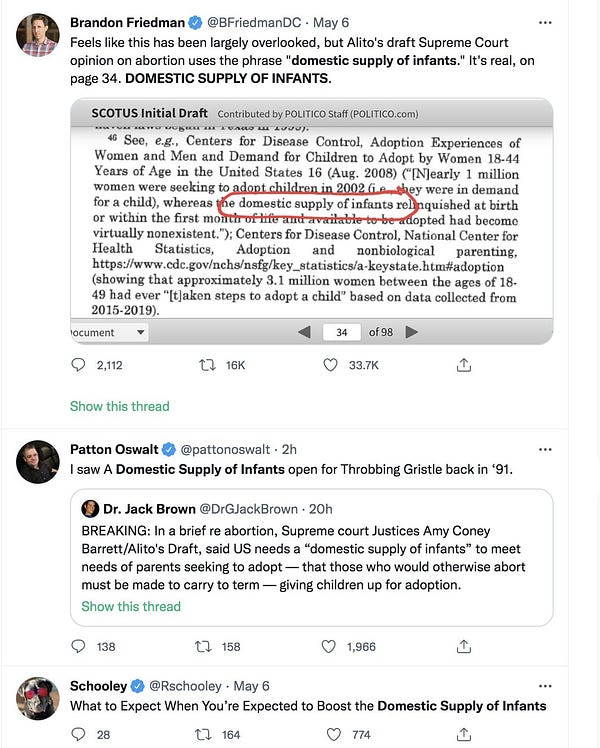
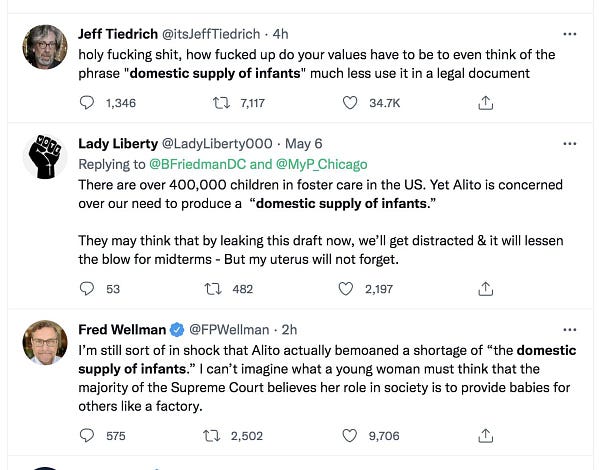
And … it’s utter nonsense.
First of all, what “brief”? Dr. Brown, who bills himself as an “emotional intelligence expert,” seems to be confusing the draft opinion with a “brief.” (Or does he think a footnote is a “brief”?) Either way, the legal expertise here is unimpressive. Secondly, Justice Barrett has been dragged into this, apparently, for no other reason than that she’s an advocate for adoption and an adoptive mother, which is kind of creepy if you ask me.
Thirdly, the text Dr. Brown highlights is actually a quote from a 2008 Centers for Disease Control publication, and it does not “bemoan” anything but points out, as a simple fact, that the number of people who want to adopt vastly exceeds the number of infants available for adoption. the text
Yes, I realize that “domestic supply of infants” (which the CDC paper uses twice) sounds a bit gross. But that’s not uncommon when scientific literature discusses human relations is either economic or biological terms—like, say, “mating strategies.”
The point Alito is making is that if more infants are placed for adoption as a result of abortion bans, they will not lack for homes. (Statistics cited about children languishing in foster care are misleading since they apply primarily to older children whom, like it or not, people are far less willing to adopt.) Alito is not citing this as a reason to ban abortion, but as a counterpoint to claims about the terrible consequences of such bans. Disagree all you want, but don’t misrepresent!
But of course, the claim that the evil Christofascists on the Supreme Court are actually trying to ensure a steady “supply on infants” for the big business of baby trafficking is already making the rounds and is probably unstoppable at this point.
Fun fact, by the way: a more honest version of this thread (with no gratuitous swipe at Justice Barrett and with a follow-up acknowledgment of the CDC source) was tweeted about 10 hours earlier by progressive activist Brandon Friedman:

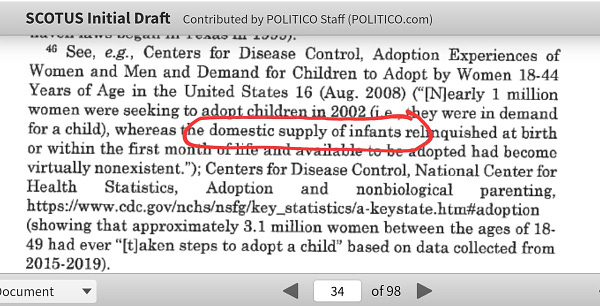
But it got about one-fourth the number of quote-tweets as Dr. Brown’s amped-up version.
And then there’s this from the progressive website Politicus USA:
It’s this sort of stuff that makes me extremely skeptical about progressive rhetoric bemoaning the scourge of disinformation on Twitter. Does this count, or nah?






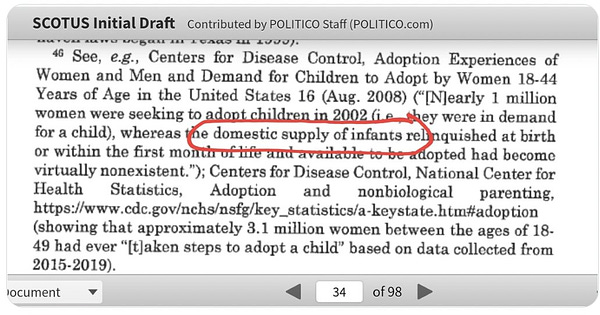
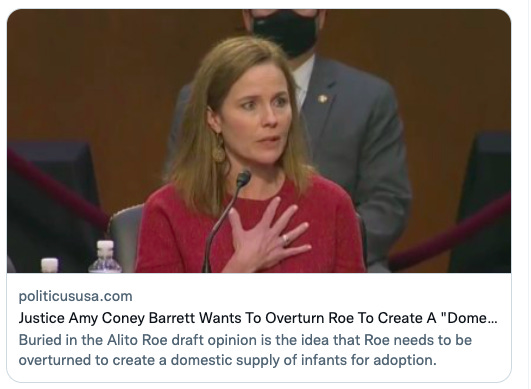
pregnancy is incredibly hard on the body. The US already has abysmal ratings re maternal mortality and that is going to get worse with the overturning of Roe. The point that most miss is the loss of bodily autonomy for 10 months. A pregnant woman can't eat what she wants, drink what she wants, etc. And the odds that a woman is going to give up the baby for adoption after suffering that are really low.
As to other rights not going away, this is a pretty bad take. Things like gay marriage, contraceptive use, interracial marriage are all based on privacy rights, same as Roe. And Alito stress that Roe is an unenumerated right, same as gay marriage, use of contraceptives, interracial marriage. They are all going to be challenged.
Finally, states are already trying to out-do each other for ridiculous laws. No travelling out of state without a negative pregnancy test! Death penalty to women who get an abortion! Life in prison for doctors upholding their oath to do no harm! Are in 1952 or 2022?
I am a little tired of this 'I'm sorry but this is a both sides' rationalization. What was once the Republican party has moved so far to the right with it's radical behavior and tactics that a Democrat taking a position on a policy that 10-15 years ago was considered conservative is now characterized as an extremist. The absolute shattering of the SCOTUS nominating process by Mitch McConnel is the prime example. And the argument RGB could have retired under Obama so the left shouldn't complain? Wow. Yet we should ignore the galactic level of hypocrisy exhibited by the GQP pushing through Comey Barret is an off the charts radicalization of the nominating process. Oh yes, and Merrick Garland stunt, how in the hell is that a conservative principle?
As far as other rights being eroded under the cloud of this 'draft opinion', Louisiana has already proposed banning IUDs and McConnell came out with a statement that a 'national ban' is a real legislative possibility. Heer is correct.